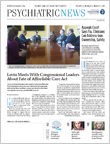The film “One Flew Over the Cuckoo’s Nest” made an indelible impression on me early on. It was an adaptation of Ken Kesey’s novel that narrated a story of comical and poignant interactions of mental patients in a psychiatric hospital with the protagonist, Randle McMurphy, who changed their lives forever. I came away with an inimical perception of American mental institutions, where treatments were often used as a form of coercion and punishment, and antipsychotic medications turned patients into zombies. Decades later, ironically, I found myself working as a pharmacist in an acute psychiatric facility. It was the start of a career in mental health that I would have never imagined in my earlier years.
My pharmacy career in mental health was during the time when advances in psychopharmacology ushered in novel, and perhaps better, psychiatric medications. In 1987, for example, the antidepressant Prozac was introduced in the United States. It was the first in the class of selective serotonin reuptake inhibitors (SSRIs), with other similar agents soon to follow. The SSRIs dramatically transformed clinical medicine, not only in this country but throughout the entire world. Today, SSRIs are indicated not only for major depressive disorder, but also for anxiety disorders, posttraumatic stress disorder, obsessive-compulsive disorder, eating disorders, and beyond.
In 1989, the Food and Drug Administration (FDA) approved the use of the antipsychotic clozapine. Clozapine, sold under the brand name Clozaril, had been available in Europe for many decades. The drug, however, did not gain traction due to its relatively high risk of lowering white blood cells, particularly neutrophils. This adverse reaction—agranulocytosis—can be fatal if not detected early. Clozapine’s use was therefore restricted to patients who failed to respond adequately to standard antipsychotic treatment. Clozapine became the gold standard for use in treatment-resistant schizophrenia, but the FDA mandated a stringent monitoring system, requiring clinicians and pharmacists to closely monitor their patients’ white blood count.
Clozapine is a remarkable drug. I witnessed firsthand the dramatic turnaround of treatment-resistant patients who resided in our inpatient facility for months and could not be placed in community living. Upon starting on clozapine, they were soon discharged to board-and-care living and outpatient mental health services.
The importance of clozapine cannot be underestimated, notwithstanding its restrictive use. It is recognized by the World Health Organization on its list of Essential Medicines as those important medications needed in health care delivery. Not long after clozapine’s approval, development of other antipsychotics soon followed, including risperidone, olanzapine, and quetiapine. These antipsychotics, spurred by the success of clozapine, transformed the clinical practice of psychiatry, as did the SSRIs.
Like clozapine, these drugs are recognized as “atypical” because their pharmacologic profile differs from older, first-generation antipsychotics such as chlorpromazine and haloperidol. The atypical antipsychotics are associated with less frequent adverse reactions of movement disorders, such as shuffling gait and stiffness. Moreover, the atypical antipsychotics improve mood not only in people with schizophrenia but also people who have mania or depression associated with bipolar disorder and treatment-resistant depression. Today, there are 12 atypical antipsychotics in the United States, and others are likely to follow in the near future.
I entered pharmacy practice in mental health in a golden era of psychopharmacology that gave us improved, novel agents. When I was asked to be a contributing author by Drs. Robert E. Hales and Stuart C. Yudofsky for a new book by APA Publishing based on their earlier book, What You Need to Know About Psychiatric Drugs, which was a consumer’s guide, I wanted to take the book further and provide some basic explanations on the psychopharmacology of these medications. Now in its third edition, What Patients Should Know About Psychiatric Medications integrates the science and drug information of the frequently utilized psychiatric medications. I approached the writing of this book as a pharmacist counseling his patient, telling the patient about the indications, dosages, side effects, the risk if used during pregnancy, dangers of overdosage, and potential drug interactions. What Patients Need to Know About Psychiatric Medications can be an invaluable reference for both consumers and health care providers.
Since Ken Kesey’s novel debuted in 1962, there has been a major paradigmatic change in our mental health system. The major change has been the deinstitutionalization of psychiatric hospitals whose goal was to shift mental health to a model of community-based services. Although the community-based system has never been as robust as originally envisioned, improvement of psychiatric medications in large part helped in the transition. Looking back, my early prejudice of our mental health system changed over the course of a career as I witnessed advances in psychiatric medication that have humanely helped our patients. ■

